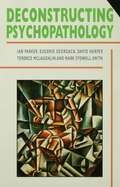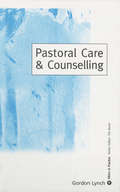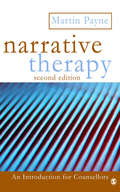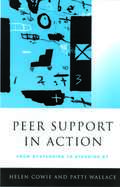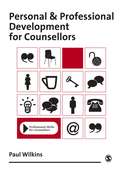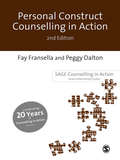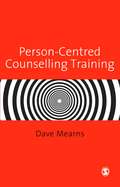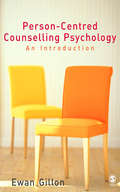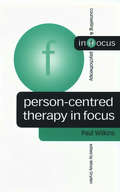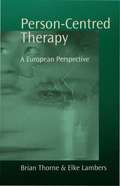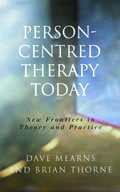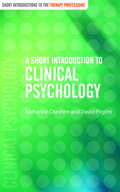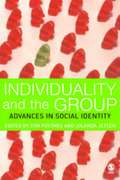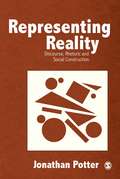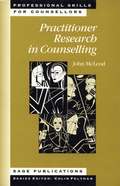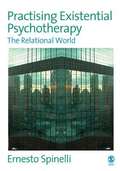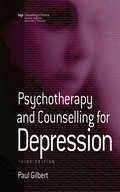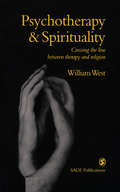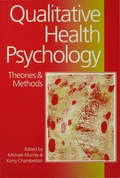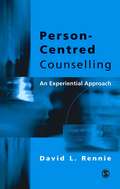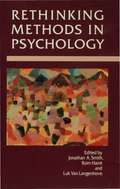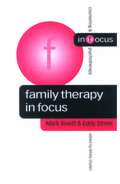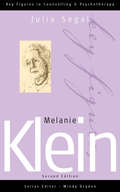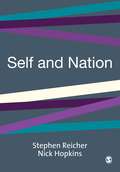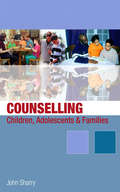- Table View
- List View
Deconstructing Psychopathology
by Dr Eugenie Georgaca Dr David Harper Mr Terence Mclaughlin Dr Mark Stowell-Smith Professor Ian Patrick`Fast becoming a contemporary classic... this book tries both to be critical and engender critical thinking in a number of ways. It offers an overview of a number of theories that address human distress as well as particular forms of "pathology". This book effectively highlights the way that western society has taken "normal"; and "abnormal" emotional states to be factual entities rather than the constructed understandings of human phenomena that they are.... should be on the reading list of every course/module that attends to human distress' - Journal of the Society for Existential Analysis This practical and accessible critique of the institutions, practices and presuppositions that underlie the study of `psychopathology' will be invaluable for students and practitioners who are working to understand mental health and distress. The authors - who come from backgrounds in clinical psychology, psychiatric social work, psychoanalysis, psychology teaching and action research - challenge the traditions of the field. They analyze the notion of `psychopathology' as a conventional term in psychology and psychiatry through the language and institutions that hold it in place; and explore the implications of deconstructive ideas for the theories and practices that sustain clinical treatments; and offer an alternative way of seeing `psychopathology', with accounts of critical professional work and good practice. Deconstructing Psychopathology is invaluable reading for students, academics and practitioners across a range of disciplines who are working to understand mental health and distress, including clinical and counselling psychology, psychiatry, psychiatric social work, counselling and psychotherapy.
Pastoral Care & Counselling (Ethics in Practice Series)
by Dr Gordon Lynch`I would recommend this text as a basic reading resource for those with an interest in the field as well as those who practice pastoral care and counselling' - Youth & Policy `This is a useful book that discusses the differences and similarities if pastoral care and counselling' - Quaker Retreat Group Newsletter `I think Gordon Lynch has produced an admirable introduction to this subject. I believe it should become a 'must' for those undertaking theological training and would also highly commend it to those engaged in the supervisory process' - Gary Haire, Accord `This book, focusing as it does on the ethics underpinning any pastoral care or counselling relationship, as a real joy to read being well-written, engaging and thought-provoking. Drawing on a rich variety of ethical dilemmas and presenting some complex ethical thinking in a disarmingly simple way, Gordon Lynch invites us to engage more deeply with our own ethical nature. We are encouraged to discover what the good life means to us and how this impacts on pastoral encounters. This book does not give us any easy ethical answers instead it invites us to reflect more deeply on our own ethical viewpoint and how this can inform our pastoral work with clients. I wholeheartedly recommend this book to anyone involved in pastoral care and counselling' - William West, Senior Lecturer in Counselling, University of Manchester `Beautifully clearly written. This is a text for those who are not experts in ethics or moral reflection. It provides a lucid introduction to the field' - Stephen Pattison, Cardiff University `This is a very user-friendly book. The writing is lucid, the reader knows at every stage just where he is in understanding the development of the writer's thought, and the material is frequently summarised. It is clear that Gordon Lynch is an expert in this field.... This is a good read' - Alan Mace, Dynamics Newsletter `This book must be considered a considerable success. The writing is clear and informed and could be used in any course dealing with the training of counsellors or pastoral carers. The line taken is original and demonstrates how pastoral care and counselling should not simply be seen as a series of techniques professionally applied and contractually enforced' - William K Kay, Reviews in Religion and Theology Pastoral Care & Counselling provides an accessible framework for understanding the role of the pastoral care worker and the ethical dimensions of practice. Central to the book is the argument that all pastoral practice is inevitably shaped by the pastoral worker's own vision of what it means to live a good life. A thoughtful approach to pastoral work therefore requires pastoral carers to reflect critically about the values that shape their practice and about how the good life can be encouraged or hindered by different aspects of their pastoral encounters. The book tackles practical concerns such as: boundary issues and the place of friendship in caring relationships; the social and institutional factors which form the context of pastoral care; and what it means to act in an ethical and competent manner. Accessibly written and illustrated with case examples, Pastoral Care & Counselling will be of interest to those already working in pastoral care and those training in theology and pastoral work.
Narrative Therapy: An Introduction For Counsellors
by Martin Payne`A thought provoking and interesting book that will be of interest to nurses and others supporting patients' - Accident and Emergency Nursing `It is a relevant and timely book that will remind therapists of the importance of the telling of client's stories as an important component of the therapeutic process. Whatever approach we use, the client's story will be a part of what we work with, so a sophisticated questioning of what 'stories/narratives' are will benefit our work. This book is a good starting point for such an exploration. It's an interesting book that will appeal to counsellors ready to challenge or add to their existing approach' - Therapy Today Narrative Therapy: An Introduction for Counsellors, Second Edition, offers a clear and concise overview of this way of working without oversimplifying its theoretical underpinnings and practices. Narrative therapy places peoples' accounts of their lives and relationships at the heart of the therapeutic process. Its main premise is that the telling and re-telling of experience by means of guided questioning can facilitate changed, more realistic perspectives, and open up possibilities for the person seeking assistance to position him- or herself more helpfully in relation to the issues brought to therapy. Drawing on the ideas of Michael White and David Epston, this fully revised, extended and updated second edition incorporates recent developments in narrative theory and practice, and introduces developments initiated by other narrative therapists worldwide. New material has been added around counselling for post-traumatic reactions, couples conflict and a sense of personal failure. The book is illustrated with extensive examples of practice with individuals and couples. It is ideal for anyone on training courses in narrative therapy, and also for counsellors who wish to consider common ground between narrative ideas and their current approach. Martin Payne is an independent therapist and trainer in Norwich, UK.
Peer Support in Action: From Bystanding to Standing By
by Helen Cowie Patti WallaceIt would be of use to adults and teachers who are starting to research peer support and the logistics of adopting such a scheme in their school. It would also be of use to saff who are currently operating a peer support scheme. I personally will use this book and keep a copy in the counselling service library, recommending it to counsellors/trainers and teachers interested or already facilitating peer support in their schools' - "British Journal of Guidance and Counselling " It is to read, comprehensive in its structure and advice and through examples of first-hand experiences, makes the reader feel enthusiastic about trying out different ideas . An excellent handbook for the manager of a peer support system for any organization' - "Anne Woodhouse, Clinical Child Psychology and Psychiatry " Peer support systems are increasingly being used in schools and other youth settings to tackle problems such as bullying, rejection, social exclusion, sexual identity, self-esteem and loneliness. Peer Support in Action is a practical guide which gives adults who work with children and young people the knowledge, understanding and practical tools to provide effective and appropriate systems of peer support. Helen Cowie and Patti Wallace combine insights drawn from practice with up-to-date research findings, to give a sound basis for peer-based interventions. They encourage readers to build on the potential for offering help which many young people have and give practical guidance on how to train, guide and supervise them in supporting their peers. Peer Support in Action is for teachers, educational psychologists, social workers, education welfare officers, counsellors and counselling psychologists and all professionals involved in the pastoral care and guidance of children and young people. "
Personal and Professional Development for Counsellors (Professional Skills for Counsellors Series #4)
by Paul Wilkins`A helpful guide for newly qualified counsellors. It gives some comprehensive ideas and tips for further development... a useful book' - Self & Society
Personal Construct Counselling in Action (Counselling in Action)
by Ms Peggy Dalton Dr Fay FransellaSAGE celebrated the 20th Anniversary of the Counselling in Action in November 2008. To view the video - click here -------------------------------------------------------------- Praise for the First Edition `In Britain, few people can have contributed more to the development of a personal construct approach than Fay Fransella and Peggy Dalton.... Their book is primarily written for those who may wish to incorporate Kelly's ideas into their existing counselling framework.... This is an informative book which is concise, well-written and with no shortage of clinical examples, relevant to all who are interested in counselling and psychotherapy' - British Journal of Psychology The revised and updated edition of this practical, accessible book gives a clear introduction to personal construct counselling for counselling trainees and practitioners alike. Outlining the key principles of the personal construct approach to counselling and relating them to practice, the book carefully explores ways in which counsellors, through credulous listening to everything the client says - and does not say - can build the client's awareness of the manner in which he or she construes problems. The range of methods that can be used to help the counsellor and client learn more about inherent contradictions and their implications, are described and illustrated. The book goes on to show how the counsellor and client in partnership can then devise experiments for change through which the client can try out new and more rewarding ways of constructing and acting. A number of approaches to facilitating change are discussed and exemplified.
Person-Centred Counselling Training
by Professor Dave MearnsPerson-centred counselling probably requires more training - and a greater intensity of training - than most other mainstream counselling approaches, but until now no one book has concentrated solely on the principles, practices and requirements of training person-centred counsellors. <p><p> Dave Mearns has drawn on the lived experiences of both trainers and trainees to demonstrate the potential range and importance of training in this field. The material covered includes selecting and supporting trainers, selecting course members, skills development, supervision and other professional issues - essential features of all counsellor training, but of particular relevance to the person-centred approach. Written expressly for both trainees and trainers, this book also extends and develops current thinking within the approach, and will be a valuable resource for all person-centred practitioners.
Person-Centred Counselling Psychology: An Introduction (Counselling And Psychotherapy Ser.)
by Dr Ewan Gillon'Not only is this the first key text on person-centred counselling psychology, but one of the best introductions to the approach. Gillon combines an in-depth understanding of the person-centred field with a highly accessible writing style to produce a book that will be of enormous value to anyone wanting to practice person-centred therapy. Essential reading for trainee and practising counselling psychologists with an interest in the person-centred approach and highly recommended for counsellors and psychotherapists of all orientations' - Mick Cooper, Professor of Counselling, Counselling Unit, University of Strathclyde Person-Centred Counselling Psychology: An Introduction is an introduction to the philosophy, theory and practice of the person-centred approach. Focusing on the psychological underpinnings of the approach, Ewan Gillon describes the theory of personality on which it is based and the nature of the therapeutic which is characterised by o unconditional positive regard o empathy o congruence. The book shows how the person-centred approach relates to others within counselling psychology and to contemporary practices in mental health generally. It also gives guidance to readers on the approach's research tradition as well as considering key issues for those wishing to train and work as a person-centred practitioner. As such, it is designed to be an applied, accessible text, providing a dialogue between the psychological basis of person-centred therapy and its application within the real world. As well as psychology students, it will be of interest to those from other disciplines, counselling trainees, those within the caring professions, and person-centred therapists from a non-psychological background. Ewan Gillon is Director of The Edinburgh Psychology Centre and Lecturer in Counselling Psychology at Glasgow Caledonian University.
Person-Centred Therapy in Focus (Counselling & Psychotherapy in Focus Series)
by Paul WilkinsPerson-Centred Therapy in Focus provides a much-needed exploration of the criticisms levelled against one of the most widespread forms of therapeutic practice. Characterized by its critics as theoretically `light', culturally biased and limited in application, until now the person-centred approach has had comparatively little written in its defence. Paul Wilkins provides a rigorous and systematic response to the critics, drawing not only on the work of Carl Rogers, but also of those central to more recent developments in theory and practice (including Goff Barrett-Lennard, Dave Mearns, Jerold Bozarth, Germain Leitauer and Brian Thorne). It traces the epistemological foundations of person-centred therapy and places the approach in its social and political context. Examining the central tenets of the approach, each chapter sets out concisely the criticisms and then counters these with arguments from the person-centred perspective. Chapters cover debates in relation to: - the model of the person - self-actualization - the core conditions - non-directivity - resistance to psychopathology - reflection, and - boundary issues. Person-Centred Therapy in Focus fulfills two important purposes: firstly to answer the criticisms of those who have attacked the person-centred approach and secondly to cultivate a greater critical awareness and understanding within the approach itself. As such it makes a significant contribution to the person-centred literature and provides an excellent resource for use in training.
Person-Centred Therapy: A European Perspective (Living Therapies Ser.)
by Professor Brian Thorne Ms Elke Lambers`In this scholarly book, Thorne and Lambers have gathered together significant contributions to the advancement of person-centred theory and practice from leading exponents of the approach in Austria, Belgium, Germany, The Netherlands, Norway and the United Kingdom.... I found the book both stimulating and challenging. The insight it offers into working with "difficult" clients is invaluable and the sections on theory stretched me in my understanding of the approach. I strongly recommend it to anyone from within or without the person-centred tradition who wants to achieve a real understanding of the approach "post Rogers" and get to grips with the vibrancy and vitality of person-centred thought in Europe' - Counselling and Psychotherapy, The Journal of the British Association for Counselling and Psychotherapy This book brings together up-to-date contributions to the development of person-centred theory and practice from leading European practitioners. The book makes available for the first time in English some of the most significant theoretical ideas and practical applications of a distinguished group of contributors at the cutting edge of the approach. It also gives a valuable insight into a vibrant professional network whose members are making a significant impact on the European world of counselling and psychotherapy. Covering a wide range of person-centred issues, the book provides unique and challenging material that will act as a springboard for debate at many levels between experienced practitioners, supervisors, trainers and trainees.
Person-Centred Therapy Today: New Frontiers in Theory and Practice
by Dave Mearns Brian Thorne`This is a book that is rooted in the origins of person-centred therapy but stands at the cutting edge of new ideas developing in this tradition. It will reinvigorate those of us already immersed in this tradition. It should convince newcomers of the vitality and potential of this approach to therapy' - Tim Bond, University of Bristol `This book is clearly a labour of love by two authors with unique abilities and unparalleled experience: readers will be educated, inspired and encouraged in their own dialogue with the person-centred approach'- Charles J O'Leary, Denver, Colorado `Mearns and Thorne have done Rogers proud in suggesting how person-centred theory and practice can, without losing its essence, evolve in new directions' - Richard Nelson-Jones, Director of the Humanistic Cognitive Institute, Chiang Mai Person-Centred Therapy Today represents a significant contribution to the development of the person-centred approach. It will be read by teachers and students of counselling and psychology who wish to keep their knowledge of the approach fully up to date and by all who consider themselves to be person-centred in their approach to helping clients.
A Short Introduction to Clinical Psychology (Short Introductions to the Therapy Professions)
by David Pilgrim Katherine CheshireA Short Introduction to Clinical Psychology gives an accessible overview of the field for psychology students and anyone considering training as a clinical psychologist. Setting out the theoretical and practical dimensions of clinical psychology, the authors examine its origins, knowledge base and applications with different client groups, in different contexts and through different modalities (individuals, groups, couples, families and organizations). They also highlight issues affecting everyday practice - from professional relationships to government policy. Drawing on the first-hand experiences of people who have recently qualified, the book describes the process of training and the transition that takes place from trainee to practitioner. Throughout, the book captures a sense of clinical psychology as a dynamic and changing field which has grown up fast alongside other more established professions involved in mental health care and which is continuing to evolve in response to contemporary needs. As an overview of the field, A Short Introduction to Clinical Psychology is an ideal text for undergraduate and post-graduate students in psychology and as initial reading for clinical psychology courses.
Individuality and the Group: Advances in Social Identity
by Tom Postmes Jolanda JettenSocial identity research has transformed psychology and the social sciences. Developed around intergroup relations, perspectives on social identity have now been applied fruitfully to a diverse array of topics and domains, including health, organizations and management, culture, politics and group dynamics. In many of these new areas, the focus has been on groups, but also very much on the autonomous individual. This has been an exciting development, and has prompted a rethinking of the relationship between personal identity and social identity - the issue of individuality in the group. This book brings together an international selection of prominent researchers at the forefront of this development. They reflect on this issue of individuality in the group, and on how thinking about social identity has changed. Together, these chapters chart a key development in the field: how social identity perspectives inform understanding of cohesion, unity and collective action, but also how they help us understand individuality, agency, autonomy, disagreement, and diversity within groups. This text is valuable to advanced undergraduate and postgraduate students studying social psychology where intergroup relations and group processes are a central component. Given its wider reach, however, it will also be of interest to those in cognate disciplines where social identity perspectives have application potential.
Representing Reality: Discourse, Rhetoric and Social Construction
by Jonathan Potter`This is an admirable book which can be recommended to students with confidence, and is likely also to become an indispensable source of reference for those researching fact construction' - Discourse & Society How is reality manufactured? The idea of social construction has become a commonplace of much social research, yet precisely what is constructed, and how, and even what constructionism means, is often unclear or taken for granted. In this major work, Jonathan Potter offers a fascinating tour of the central themes raised by these questions. Representing Reality overviews the different traditions in constructionist thought. Points are illustrated throughout with varied and engaging examples taken from newspaper stories, relationship counselling sessions, accounts of the paranormal, social workers' assessments of violent parents, informal talk between programme makers, political arguments and everyday conversations. Ranging across the social and human sciences, this book provides a lucid introduction to several key strands of work that have overturned the way we think about facts and descriptions, including: the sociology of scientific knowledge; conversation analysis and ethnomethodology; and semiotics, post-structuralism and postmodernism.
An Introduction to Research in Counselling and Psychotherapy (Professional Skills for Counsellors Series)
by John McleodIntroducing the basic principles of research theory and practice, this book is the ideal starter text for any counselling trainee or practitioner learning about the research process for the first time. Structured around common training topics, the book: - Explains why you need to do research at all: what it is, why it's important and its historical and philosophical context - Guides you through the confusing mass of research literature - Covers the ins and outs of actually doing research: practical and ethical issues - Helps you get the most out of research - how to evaluate the outcomes and use research to investigate the process of therapy. Written in a language familiar to first-year trainees and using a range of features to enhance learning, this accessible introduction will equip both trainees and qualified therapists with the essential nuts and bolts to understand research. John McLeod is Emeritus Professor of Counselling at the University of Abertay Dundee and adjunct Professor at the University of Oslo, Norway.
Practising Existential Psychotherapy
by Ernesto SpinelliExistential psychotherapy has emerged as an approach that is distinctively different to that of the other models and systems within psychotherapy. It provides a set of significant challenges to, and critiques of, contemporary Western psychotherapy both at the level of theory and of practice. Although a substantial amount of writing that seeks to describe and delineate the theoretical underpinnings of existential psychotherapy already exists, this is not the case with texts dealing with the application of theory in the form of practice. Practising Existential Psychotherapy examines the unique qualities and possibilities of an existential approach to psychotherapy. Drawn from Ernesto Spinelli's own experience as an internationally recognised theorist, lecturer and practitioner, the book's overall aim is to provide a thorough and accessible explication of existential psychotherapy in practice. Beginning with an overview of the theoretical underpinnings and distinguishing features of existential psychotherapy, the text describes and develops a three-phase structural model for its practice. As well as describing the key components of each phase, the text provides descriptive examples and topic-focused exercises designed to assist readers in developing their own practice-based understanding of existential psychotherapy. Ernesto Spinelli is a Professor in the School of Psychotherapy and Counselling at Regent's College, London.
Psychotherapy and Counselling for Depression (Therapy in Practice)
by Paul Raymond Gilbert`Excellent! Excellent! Excellent! I would thoroughly recommend this book to any other counsellor of psychotherapist. It is described on the back cover as 'outstanding', 'valuable' and an 'essential resource' and I would fully endorse all of these descriptions. I have been qualified for 10 years and have had extensive client experience, but feel I have gained so much from Gilbert's wisdom on this topic. It is excellent value for money and again I would recommend it to any practitioner' - The Independent Practitioner 'This book takes the reader gently but thoroughly through the biopsychosocial processes that underpin depression. Excellent worksheets and information sheets are provided as appendices. [It] is a valuable resource for those who already work with depression and essential reading for those considering working in this field' - Therapy Today `Paul Gilbert provides the reader with a refreshingly wide-ranging, integrative and up-to-date understanding of the nature, assessment and treatment of depression. All psychological therapists will benefit from reading his important book' - Healthcare Counselling and Psychotherapy Journal `Paul Gilbert writes in a scholarly, yet accessible, style on the bio-psychosocial perspectives of depression. I agree with him that knowledge of such areas is crucial to being able to work effectively with people experiencing depression' - Nursing Standard, 5 star review `Psychotherapy and Counselling for Depression, Third Edition by the distinguished psychologist, Paul Gilbert, is an outstanding contribution to the field. I read this book with great enthusiasm and interest - and, I must acknowledge - admiration. All clinicians will benefit from reading this valuable book' - Robert L. Leahy, President, International Association for Cognitive Psychotherapy Paul Gilbert's Psychotherapy and Counselling for Depression, Third Edition is a popular and practical guide to working with people suffering from depression. The book is based on a wealth of research into evolutionary, cognitive, behavioural and emotion-focused approaches to depression. It outlines how to work with general negativity, sense of failure and abandonment, and feelings of powerlessness, anger, shame and guilt The book examines the essential stages of the therapeutic process from conceptualization and formulation through to a wide variety of interventions for different types of difficulty. It has been greatly revised, expanded and updated for the Third Edition and: o explores in depth the biopsychosocial processes underpinning depression o shows how a compassionate mind approach can be incorporated into different types of therapy o includes a new chapter focusing on the role of the therapeutic relationship, including therapeutic dialogues o features detailed guidance with case examples on how to work with a wide variety of depressions. Psychotherapy and Counselling for Depression, Third Edition is an essential resource and comprehensive guide for practitioners and anyone involved with treating depression. Paul Gilbert is Professor of Psychology in the Mental Health Research Unit at Kingsway Hospital, Derby.
Psychotherapy & Spirituality: Crossing the Line between Therapy and Religion (Perspectives on Psychotherapy series)
by Dr William West`There have been many books written about counselling with respect to class, politics, gender, culture and similar issues but, as far as I am aware , this is the first major work to be presented in this country about working with a client's spirituality and the importance this may have.... Is a must for trainees in the field and for those who feel a client's spirituality is an irrelevance'- Cahoots `This is a textbook covering all aspects of this subject, eg there is a chapter on "why therapists need training in dealing with spiritual issues" and another on "the meeting place and the differences between spiritual direction and therapy". I recommend this book to practitioners in this field' - Retreats This thoughtful and intelligent book encourages psychotherapists and counsellors to consider seriously the relationship between spiritual experiences and therapeutic practice. It proposes that therapy itself can be seen as a spiritual process and discusses the implications of this view for therapists, clients and the wider world. Examining the relationship between spirituality and the main schools of therapy, William West distinguishes clearly between spiritual direction and specific therapies. He offers practical advice to help practitioners increase their awareness of spiritual issues, and guidance on the use of spiritual interventions within therapy.
Qualitative Health Psychology: Theories and Methods (Behaviour And Health Ser.)
by Michael Murray Kerry Chamberlain`This book constitutes a valuable resource for postgraduate students and researchers. Most.... of the chapters succeed in providing a clear and comprehensive introduction to the various approaches and/or methods, thus enabling the reader to make an informed decision about whether or not they wish to pursue the topic further. The book as a whole is also very well referenced and this makes it a source of essential information for students and researchers with an interest in qualitative health psychology' - Health Psychology Update This book explains the role of qualitative research within health psychology. Theories and methods from a qualitative perspective are highly varied but, in general, differ from the positivist approach which is concerned with quantifying the individual risk factors presumed to cause health and illness behaviour. This book shows clearly how a qualitative approach offers a better understanding of the experience of illness while locating it in its broader social context. Providing a detailed examination of these issues, the book is organized into three sections - the first considers some of the main theoretical perspectives underlying qualitative research in health psychology including discourse analysis and narrative as well as the social context and embodiment of health and illness; the second examines some of the practical issues involved in conducting qualitative research with different populations, such as children and the terminally ill; and the final section considers a range of analytic issues and specific analytic approaches such as grounded theory and action research, and the evaluation of qualitative methods.
Person-Centred Counselling: An Experiential Approach (Clinical And Counseling Ser.)
by David L. Rennie`This book offers a truly engaging "read". The writing style is good and it gives the reader a wide range of perspectives, from the meta-theoretical to the concrete practical experience of clients and counsellors. . . . David Rennie's book serves to continue the development as well as the exposition of the person-centred approach to counselling' - British Journal of Guidance and Counselling `This is a very good book. . . clearly within the humanistic/experiential tradition. . . It seems to me to be very important that this kind of research continues - it is the raw data of the counselling profession' - Person-Centred Practice This book contains powerful new ideas about person-centred theory and practice. Supported by intensive qualitative research into the client's experience of counselling, the book highlights the significance and pervasiveness of reflexivity - defined as self-awareness and agency within that self-awareness - and explores surprising ways in which clients contribute reflexively to the counselling process. Vivid examples highlight activities, show the therapy in action and illustrate how counsellors can use their own experiences creatively to facilitate their attunement to themselves, their clients and their relationships with them. The theoretical framework covers matters such as the use of images and metaphor, counsellor transparency and the assistance of clients' agency. Emphasis is placed on the client/counsellor relationship through such crucial areas as the working alliance, power dynamics and metacommunication.
Rethinking Methods in Psychology (Rethinking Psychology Ser.)
by Professor Rom Harre Professor Jonathan A Smith Luk Van LangenhoveThe recent widespread rejection of conventional theory and method has led to the evolution of different ways of gathering and analyzing data. This accessible textbook introduces key research methods that challenge psychology's traditional preoccupation with `scientific' experiments. The book provides a well-structured guide to methods, containing a range of qualitative approaches (for example, semi-structured interviews, grounded theory, discourse analysis) alongside a reworking of quantitative methods to suit contemporary psychological research. A number of chapters are also explicitly concerned with research as a dynamic interactive process. The internationally respected contributors steer the reader through the main stages of conducting a study using these methods.
Family Therapy in Focus (Counselling & Psychotherapy in Focus Series)
by Mark Rivett Dr Eddy StreetDrawing on many years' experience in practice, teaching and research, Mark Rivett and Eddy Street present philosophical, sociological and empirical views of family therapy. Balancing the perceived benefits against the potential limitations, they pose questions, which challenge those within the profession to think hard about their role. } does family therapy work? } can those most in need really be helped? } is family therapy a means of social control? } who does professionalization help? While most texts offer a straightforward and uncritical perspective, in contrast Family Therapy in Focus aims to stimulate debate among practitioners and to help trainees adopt a more reflective and critical attitude towards their own professional development and the development of their profession.
Melanie Klein (Key Figures in Counselling and Psychotherapy)
by Julia SegalMelanie Klein was without doubt one of the most influential figures in the development of psychoanalysis. Whilst constantly challenging Freud's theories, and at the same time placing more importance on some of the neglected aspects of his work, Klein developed new psychoanalytic concepts from her detailed observations of the behaviour and thought processes of the children and adults she treated in the consulting room. In this Second Edition of Melanie Klein, Julia Segal uses case studies of Klein's sessions with children to show how she developed her unique form of communication with her clients. As well as assessing Klein's major theoretical and practical contributions to the profession, the author examines and challenges the criticisms aimed at Klein, and traces her influence on counsellors and psychotherapists working today. In contrast to existing books, which require specialist psychoanalytic knowledge, Julia Segal provides a concise and refreshing introduction to Klein's life and work which is accessible to all.
Self and Nation: Categorization, Contestation and Mobilization
by Stephen D. Reicher Dr Nick Hopkins`Here is a rare book, a truly helpful piece of work on the psychology of nationalism. Stephen Reicher and Nick Hopkins, of St Andrews and Dundee Universities, focus much of their study of recent Scottish experience, drawing on inter-views with political activists. The cast light on why our `Unionists' and nationalists feel so sure their side represents our national identity and the other lot doesn't. For once it is a compliment to say a book raises more questions than it answers. Stephen Reicher and Nick Hopkins open up large questions closer inspection' - Glasgow Herald `In this impressive book Stephen Reicher and Nick Hopkins draw from a wealth of research to address issues of nationality, national identity and nationalism that lie at the heart of core topics in social psychology and its cognate disciplines. They have produced a powerful and scholarly text that interweaves an abundance of rich empirical data with a broad-reaching and timely theoretical statement. Moreover, the content is not confined to matters of national identity but also extends to treatments of stereotyping, prejudice, intergroup conflict, leadership, collective action, and the self .... For all these reasons, the book should serve essential and compelling reading for a very broad audience' - S Alexander Haslam, Australian National University `Stephen Reicher and Nick Hopkins write with elegance and clarity, drawing the reader into their argument, without losing any of its complexity and nuance. This book deserves to make a major impact in studies of nationalism. It ought to become a classic.... I'm quite bowled over - it's really brilliant' - David McCrone, Edinburgh University
Counselling Children, Adolescents and Families: A Strengths-Based Approach
by Dr John Sharry`I recommend this book to anyone who lives or works with families, children or teenagers' - Nurturing Potential `This is a valuable book, worth attention in every child and family service. My own agency has ordered a copy!' - Robert Cumming, Nurturing Potential `John Sharry's book is a jewel in the solution-focused literature. It is clearly and engagingly written, draws on a host of ideas from different therapeutic approaches and is packed with practical examples. There is no better book on strengths-based therapy with children and adolescents. Every team should have one' - Chris Iveson, Brief Therapy Practice Counselling Children, Adolescents and Families describes an innovative approach to therapeutic work which builds on the strengths of children and their parents. As the author's experience shows, helping clients to focus on potential solutions rather than problems can be a powerful means of engaging them in the therapeutic process, even in the most conflicting family circumstances. Harnessing the client's personal, family and community resources in this way also helps counteract their feelings of powerlessness and the possibility of increasing reliance on professional services. Part One outlines the basic principles of a solution-focused and strengths-based approach, tackling such thorny issues as how and when to use diagnosis. Part two describes creative applications of the approach, using groupwork, play-based activities and video feedback. Part Three, examines practical issues which arise in more 'difficult' cases, such as child abuse and suicidal teenagers and children. This book is aimed at professionals and trainees in fields including social work, mental health, childcare, education, psychotherapy and counselling.
